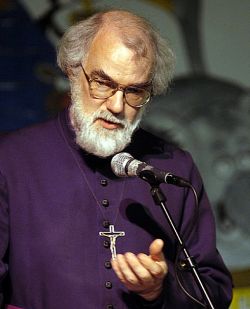Message de l'archevêque de Canterbury
Symposium œcuménique
par ROWAN WILLIAMS
Ceux qui, par la grâce de Dieu, modèlent notre vie de disciples sont une grande multitude dont les visages nous sont souvent cachés
TEXTE ORIGINAL ANGLAIS DE LA COMMUNICATION
DE L'ARCHEVÊQUE ROWAN DE CANTERBURY
AU COLLOQUE "UNE NUÉE DE TÉMOINS"
(Bose, 29 octobre-2 novembre 2008)
to the Prior and Community of the Monastery of Bose
and all attending the Conference held in collaboration with
the Faith and Order Commission of the World Council of Churches:
A Cloud of Witnesses:
opportunities for Ecumenical Commemoration
In one of the hymns for Vespers on the Sunday of All the Saints in the Orthodox Church the saints are addressed as ‘Orators of the Spirit’. I hope that in this meeting, all participants will feel that the Holy Spirit is truly speaking to them through the company of the saints, and also through the human fellowship of this encounter. For since we are all called to sanctity, then we are all called to speak in and for the Holy Spirit.
Holiness is never an individual matter. For a human person to become holy, so Christians believe, is for them to be taken into the Body of Christ, so that their life is informed, shaped, determined by the eternal life of God the Son as it was and is embodied in Jesus of Nazareth; it is for them to be ‘immersed’ by the gift of the Holy Spirit in the flow of the Son’s life towards the Father, the everlasting movement of total adoration and self-giving love. To be holy is to stand with Christ, and to stand with Christ is to be a member of his Body, living in and through the communion of renewed human persons that the Spirit creates.
Hence the naturalness for St Paul of referring to all the baptized as holy – as ‘saints’: in principle, all those who through their baptism are brought into the place where Jesus is, are caught up in this flow of his life towards the Father. But we quite reasonably use the word ‘saint’ more commonly to refer to those in whom we can see that flow evidently at work. The person whom the churches recognize as a saint in the usual sense is going to be one who shows what is true for all Christians, one who offers a unique definition of what the baptized life might mean. The holy person will have learned from all those around them how to live in Christ; and they will have learned even from those whose lives may not show the strongest or clearest marks of baptismal faithfulness. And the rest of us, as we receive and reflect on that definition, are called to scrutinize our own lives in its light, asking how our own baptized identities might be deepened and given more integrity. When a saint is recognized and commemorated, the Church proposes to its own people and to the wider world a model of life in community with Jesus, and in community with all others who have been called; a saint is someone who is himself or herself shaped in discipleship by living in the body of Christ, and also someone whose own life feeds that Body and draws it back to its heart and its calling.
But what about saints in a divided Church? Sometimes we may be inclined to think that there is something special about the saints of the ‘undivided Church’ – before the schism of East and West, or before the Reformation; or, worse, we may be tempted to use the saints of our particular tradition as proofs that our own confession has been more successful at nourishing holiness than others. This is understandable: if a Roman Catholic looks at a saint of the Eastern Christian world, they may feel that such a saint’s witness is somehow weakened or compromised by their separation from or even hostility to the Roman Communion. Anglicans and Protestants cannot fail to be aware that the post-Reformation saints of the Roman Catholic Church belonged to a body that regarded their own Reformed Christian witness as defective and misguided in many ways. Even more problematically, in West and East, there are those who have suffered torment and death at the hands of fellow-Christians and who are regarded as martyrs. Catholics, Orthodox, Anglicans and Protestants have all been involved in one way or another in inflicting as well as enduring suffering for what they believed Christ had called them to: but how can we celebrate the memory of someone who died at our own hands?
In Britain, the calendar of the Church of England commemorates those who died as ‘Protestant heretics’ under the persecution of Queen Mary Tudor; it also commemorates those, like John Bunyan and Richard Baxter, who were persecuted by Anglican authority, and, in providing a celebration of all the saints and martyrs of the Reformation era, indirectly acknowledges those who died for their loyalty to the Pope at the hands of the British state. Admirable as this is, it needs something of a theology to make it more than just the willingness to acknowledge courage or integrity wherever they occur; it needs exposition in terms of the understanding of the Body of Christ. And it may be that such a theological exposition also gives us better insight into the theology of sanctity overall.
